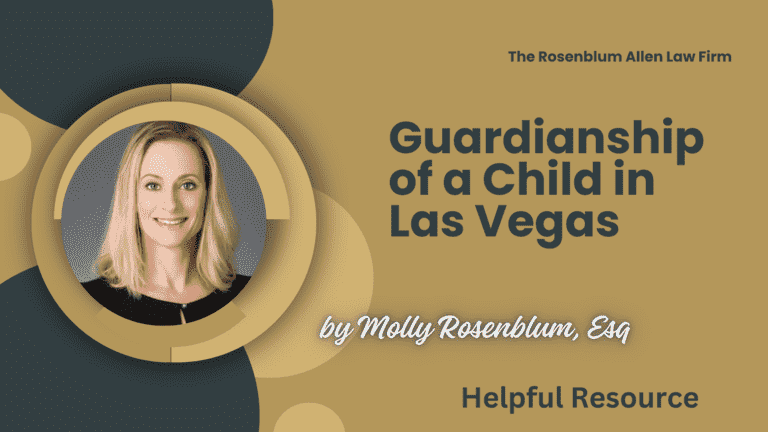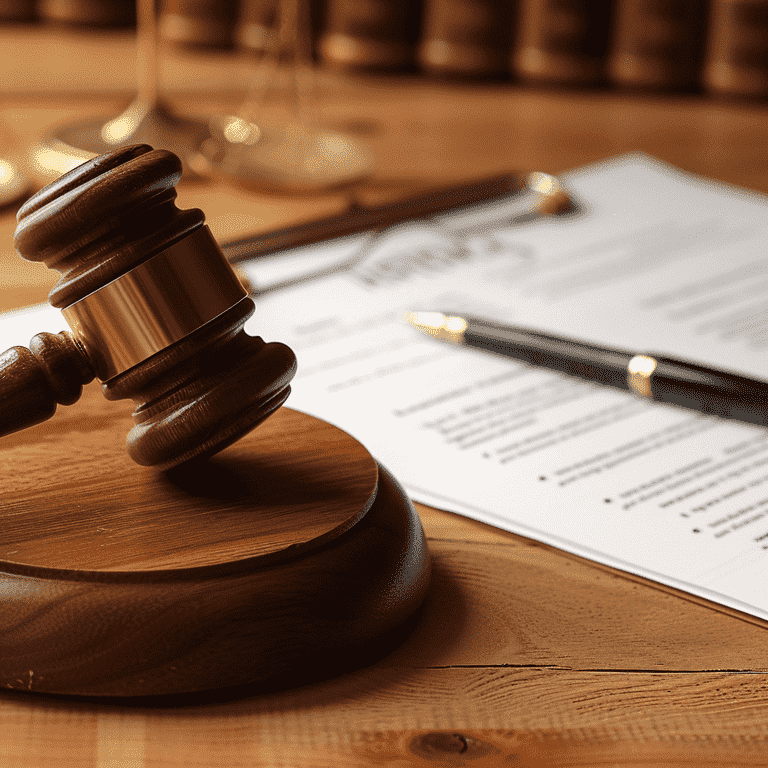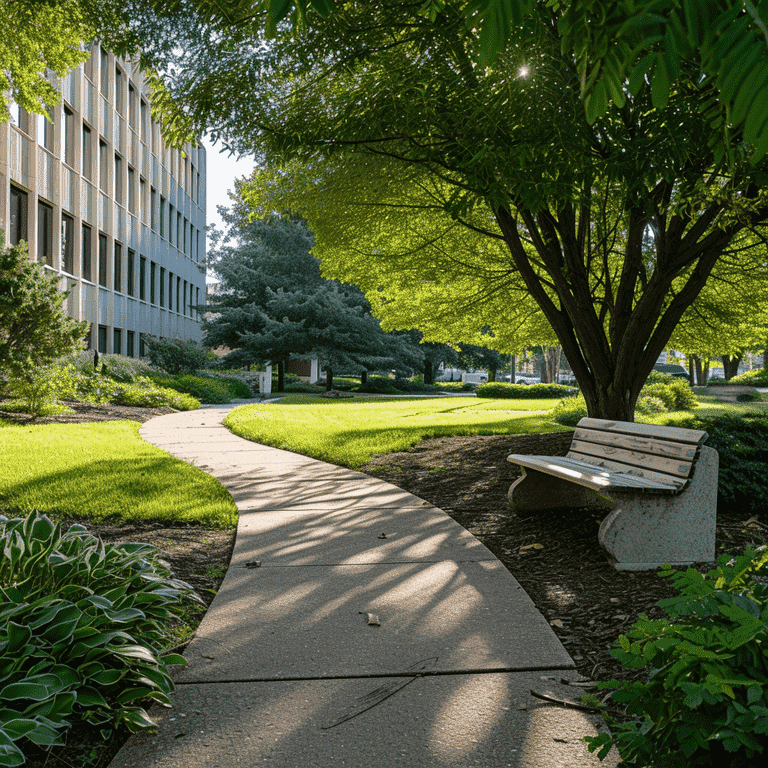Guardianship in Las Vegas is a vital legal arrangement, providing care for children when their parents are unable to do so. This arrangement is essential when the child’s welfare is at stake. In this guide, we’ll explore the parts of guardianship, its importance, and how it affects the guardian and the child in Las Vegas.

 Overview of Guardianship in Las Vegas
Overview of Guardianship in Las Vegas
Guardianship is a legal relationship set up by the court. Someone appoints a guardian to care for a child’s needs. This includes shelter, education, and medical care. In Las Vegas, state laws and rules govern this process. They ensure the child’s best interests come first.
Importance of Guardianship for a Child
Guardianship provides a stable environment for children. Parents cannot care for them due to reasons such as incapacity, absence, or other issues. It lets the child keep a sense of normalcy and security. This is during tough times.

Types of Guardianship in Las Vegas
There are two main types of guardianship in Las Vegas: temporary and permanent. Each type serves a different purpose and comes with its rules and responsibilities.
Temporary Guardianship
Temporary guardianship is a short-term solution. It gives the child immediate care.
Definition and Duration
Guardianship is typically granted when the child’s parents temporarily cannot care for them. It usually lasts for a period of six months to one year, depending on the specific circumstances.
Application Process and Requirements
To get temporary guardianship, one must file a petition with the local court. The petition must include details about the child’s situation. It must also include the proposed guardian’s relationship with the child. The court will review the application. It will consider factors. These include the guardian’s ability to provide safety and stability.
Permanent Guardianship
Permanent guardianship is a longer arrangement. It often lasts until the child turns 18.
Distinction from Temporary Guardianship
Permanent guardianship is different from temporary guardianship. It is for situations where the child is unlikely to return to their parent’s care. This could be due to long-term issues such as chronic illness or incapacity of the parents.
Legal Implications and Responsibilities
In permanent guardianship, the guardian takes most of a parent’s duties and rights. This includes making decisions about the child’s education, health, and welfare. The guardian also has a legal obligation to act in the child’s best interests at all times.

Legal Requirements for Guardianship in Las Vegas
To become a guardian in Las Vegas, one must meet certain legal criteria and follow a specific procedure.
Eligibility Criteria for Guardians
To be considered eligible, prospective guardians must fulfill various requirements.
Age and Residency Requirements
The guardian must be an adult. They are typically over 18 years old and should live in Las Vegas. This makes legal proceedings easier and helps them interact with the child.
Background Checks and Suitability
The court will do thorough background checks. They will check if the prospective guardian has no history of child abuse, neglect, or other crimes. They also assess if the guardian’s lifestyle, stability, and relationship with the child are suitable.
Documentation and Legal Forms
Proper documentation is critical to the guardianship process.
Necessary Forms for Filing
The prospective guardian must complete and submit many forms. These include the petition for guardianship. They also include consent forms (if needed) and other court-ordered documents.
Supporting Documents Required
We may need more documents. These include the child’s birth certificate. They also need the guardian’s ID and proof of residency. Also, they include any relevant legal documents about the child’s parents.

The Process of Obtaining Guardianship
Navigating guardianship can seem hard. But, understanding each step makes it easier. Here’s how to approach it in Las Vegas.
Filing for Guardianship
This is the first and crucial step in the process.
Steps to File a Petition
Gather Information: Collect all necessary documents and information about the child and potential guardian.
Complete Required Forms: Fill out the guardianship petition and other related forms.
Submit to Court: File the forms with the appropriate family court in Las Vegas.
Court Fees and Waivers
Fees: Filing fees are associated with the petition, which vary depending on the court.
Waivers: If the guardian cannot afford these fees, they can apply for a fee waiver.
Court Procedures and Hearings
The court plays a crucial role in the guardianship process.
What to Expect at the Hearing
Presentation of the Case: The prospective guardian presents their case, including reasons for guardianship and their relationship with the child.
Questions from the Judge: The judge may ask questions to better understand the situation and the guardian’s suitability.
Representation and Legal Support
Legal Representation: It’s advisable to seek legal advice, although not mandatory.
Self-Representation: If you choose to represent yourself, ensure you understand the legal procedures and requirements.

Roles and Responsibilities of a Guardian in Las Vegas
Being a guardian is a big responsibility. It includes many parts of the child’s life.
Legal Duties of a Guardian
These are the critical legal responsibilities every guardian must fulfill.
Decision-Making Authority
Educational Decisions: Guardians decide where the child goes to school and how their educational needs are met.
Healthcare Choices: This includes decisions about medical treatments and healthcare providers.
Financial Management for the Child
Handling Finances: Managing any funds or assets owned by the child responsibly.
Providing Support: Ensuring the child’s day-to-day financial needs are met.
Guardian’s Responsibility towards Child’s Welfare
The emotional and social wellbeing of the child is also a priority.
Education and Healthcare Decisions
School Involvement: Being involved in the child’s education, attending parent-teacher meetings, etc.
Health and Wellness: Overseeing the child’s physical and mental health, including regular check-ups.
Emotional and Social Wellbeing
Emotional Support: Providing a supportive and nurturing environment for the child.
Social Activities: Encouraging the child to engage in social activities and hobbies.
Guardianship vs. Adoption
You must understand the differences. They are between guardianship and adoption. It is crucial for making informed decisions. You must make them in the best interest of the child.
Critical Differences Between Guardianship and Adoption
The distinction lies in the legal and emotional aspects.
Legal Status and Parental Rights:
In guardianship, parents keep their legal rights over the child. The court can revoke or change these rights.
Adoption permanently transfers all rights and duties from the biological parents. It gives them to the adoptive parents.
Permanence and Revocability:
Guardianship is often seen as a temporary arrangement and can be subject to change.
Adoption is a permanent legal relationship that is not easily dissolved.
Choosing Between Guardianship and Adoption
Deciding which route to take depends on the circumstances and long-term considerations.
Situational Considerations:
Parents often choose guardianship. They expect to resume care later.
Adoption is considered when the child cannot return to their biological parents. They need a permanent home.
Long-Term Implications for the Child:
Think about the emotional and psychological impact on the child in both scenarios.
Consider the stability and permanency that the child needs.

Termination or Modification of Guardianship
Guardianship arrangements may need to change as circumstances evolve.
Grounds for Termination or Modification
The reasons for altering guardianship can vary.
Change in Circumstances:
This could be because the parents’ situation improved. Or, the guardian’s ability to care for the child changed.
Best Interests of the Child:
Any decision to change or end guardianship must put the child’s welfare first. It must also consider their well-being.
Legal Process for Termination or Modification
Legal protocols govern the process to ensure the child’s best interests are served.
Filing a Motion:
You must file a motion in court to ask to end or change a guardianship.
Court Evaluation and Decision:
The court will review the current situation. It will look at the reasons for the request and its impact on the child.
All parties can present their case at a hearing.

Support and Resources for Guardians in Las Vegas
Navigating guardianship can be challenging, but resources and support systems are available.
Legal Aid and Help
Finding the right help is essential.
Finding Legal Support and Representation:
Many organizations in Las Vegas offer legal aid and advice for guardianship cases.
It’s important to seek knowledgeable legal counsel, especially in complex situations.
Accessing Community Resources:
Community centers and non-profit organizations can provide additional support and guidance.
Support Groups and Educational Programs
Connecting with others in similar situations can be invaluable.
Networking with Other Guardians:
Support groups offer a platform to share experiences, advice, and emotional support.
Ongoing Education and Training for Guardians:
The programs help guardians understand their legal duties. They also teach how to best care for the child.
Why You Haven’t Hired a Guardianship Attorney Yet
Watch this short video to take the next big step toward defending your rights in a guardianship case.

Breaking It All Down
In this guide, we have navigated the complex yet vital topic of guardianship of a child in Las Vegas. It’s important to reiterate this role’s significance and its profound impact on the lives of all involved.
Recap of Guardianship Importance in Las Vegas
Guardianship stands as a beacon of hope and stability in a child’s life when their biological parents are unable to fulfill their roles. It’s a commitment that involves:
- Legal Responsibility: Taking on the part of a guardian means accepting a significant legal responsibility for the child’s welfare.
- Emotional Investment: Beyond legal duties, guardianship involves emotional dedication to support and nurture the child’s growth and development.
Final Thoughts and Encouragement for Prospective Guardians
For those considering taking on this noble role, remember:
- Impactful Journey: While challenging, guardianship is a journey that can bring immense satisfaction and a sense of purpose.
- Support Systems: You are not alone. Las Vegas offers a legal, emotional, and educational support network to guide you.
- Transformative Experience: Embracing this role can profoundly impact your life and the child, fostering a bond that can last a lifetime.
In summary, guardianship of a child in Las Vegas is a multifaceted process that requires careful consideration, legal understanding, and a deep commitment to the child’s well-being. This guide provides a comprehensive overview to assist those embarking on or involved in this journey. Remember, while demanding, the path of guardianship is equally rewarding, offering a chance to make a lasting difference in a child’s life.

Frequently Asked Questions
What happens if the guardian can no longer care for the child?
If the guardian becomes unable to care for the child, they must inform the court. The court will then reassess the child’s situation and may appoint a new guardian or make alternative care arrangements.
Can a guardian decide to adopt the child they are caring for?
Yes, a guardian can choose to adopt the child, but this is a separate legal process from guardianship. Adoption involves permanently terminating the parental rights of the child’s biological parents.
Are there financial help programs available for guardians in Las Vegas?
Yes, there are financial assistance programs available for guardians in Las Vegas. These programs, offered through state and local agencies, provide support for childcare, education, and healthcare expenses.
How does the court determine the best interest of the child?
The court considers various factors, including the child’s emotional, physical, and educational needs, as well as the stability of the proposed guardian’s home and the child’s relationship with the guardian.
After establishing guardianship, can biological parents regain custody?
Yes, biological parents can regain custody, but they must demonstrate to the court that their circumstances have improved and that they are now capable of adequately caring for their child.
Must a guardian have a lawyer during the guardianship process?
While it’s not mandatory, it’s advisable for guardians to have legal representation. A lawyer can help navigate the legal complexities of the process and ensure everything is done correctly.
What is the role of a guardian ad litem in the guardianship process?
A guardian ad litem is appointed by the court to represent the child’s best interests during guardianship proceedings. They advocate for the child’s needs and desires.
How does one prepare for a guardianship hearing in Las Vegas?
Preparation involves gathering all necessary documents, understanding the legal responsibilities of guardianship, and consulting with a lawyer to discuss the case and potential questions during the hearing.
Can a child express their preference regarding their guardian?
Yes, the court may consider the child’s preference, especially if the child is old enough and mature enough to express a reasoned opinion.
What are a guardian’s responsibilities regarding the child’s education?
Guardians must ensure the child receives a good education, including enrolling them in school, monitoring their progress, and participating in school-related activities and events.
How are conflicts between a child’s guardians and biological parents resolved?
Conflicts are typically resolved through mediation or by the court, with the child’s best interests being the primary consideration in any decisions.

Glossary
Guardianship: A legal relationship where a person is appointed by the court to make decisions and care for a child when the biological parents cannot do so.
Temporary Guardianship: A short-term guardianship arrangement, usually six months to one year, designed to provide immediate care for the child without their parents.
Permanent Guardianship: A long-term guardianship arrangement where the guardian assumes the responsibilities of a parent, typically until the child turns 18.
Legal Custody: The legal authority to make significant decisions on behalf of a child, including matters of health, education, and welfare.
Physical Custody: The responsibility of physically caring for the child, including providing day-to-day needs like shelter, food, and clothing.
Biological Parents: The child’s birth parents who have natural parental rights and responsibilities unless legally terminated or suspended.
Adoption: The legal process by which an individual or couple becomes the legal and permanent parent(s) of a child, severing the ties with the child’s biological parents.
Guardian ad Litem: A person appointed by the court to represent the best interests of the child in legal proceedings, typically in cases involving custody, adoption, or guardianship.
Court Petition: A formal request is made to the court asking for legal guardianship of a child. It includes necessary information about the child and the potential guardian.
Background Check: An investigation into a prospective guardian’s history, including criminal records, to assess their suitability for guardianship.
Legal Representation: Legal counsel or an attorney who assists and represents individuals in legal matters, including guardianship proceedings.
Financial Assistance Programs: Government or private programs that provide financial support to guardians for the child’s care and needs.
Best Interest of the Child: A legal standard used by courts to make decisions that affect a child, prioritizing the child’s health, safety, and well-being.
Parental Rights: Biological parents have legal rights and responsibilities for their child, including the right to make decisions about their child’s life.
Mediation is a process in which an impartial third party helps disputing parties (e.g., biological parents and guardians) reach a mutually acceptable agreement.
Legal Duties of a Guardian: The legal obligations of a guardian include making decisions about the child’s education, health care, and general welfare.
Revocability of Guardianship: The possibility that a guardianship arrangement can be legally reversed or altered based on changes in circumstances or the child’s best interests.

Additional Resources for You
Our esteemed lead attorney, Molly Rosenblum Allen, Esq, extends her expertise beyond divorce law, offering a wealth of resources for individuals navigating the complexities of guardianship. These resources are meticulously designed to provide clarity and assistance in various guardianship matters:
Las Vegas Guardianship Attorney: A specialized resource for those seeking guardianship guidance in Las Vegas, offering expert legal advice.
Legal Guardianship: Comprehensive insights into the legal framework of guardianship, helping you understand your rights and responsibilities.
Guardianship Forms: Access essential forms and understand the documentation required for guardianship proceedings.
Adult Guardianship: Guidance on the responsibilities and legal processes involved in becoming a guardian for an adult.
Types of Guardianship: An overview of the different types of guardianship, helping you understand which type best fits your situation.
Pros and Cons of Guardianship: An unbiased look at the advantages and disadvantages of guardianship, aiding in informed decision-making.
Dependency Cases: Expert insights into dependency cases, providing support and guidance through complex legal scenarios.
Terminate Legal Guardianship: Essential information for those seeking to understand the process and implications of terminating a guardianship.
Parental Responsibility for Disabled Adults in Nevada: Specialized resources focusing on the unique challenges and responsibilities of caring for disabled adults in Nevada.
Nevada Power of Attorney: A guide to the power of attorney in Nevada, detailing its role in guardianship and how it can be utilized effectively.
Molly Rosenblum Allen, Esq’s dedication to providing comprehensive legal resources is evident in the breadth and depth of these guides. We encourage you to explore these resources to find the support and answers you need during your guardianship journey.

Outside Resources for You
American Bar Association (ABA): Offers a wealth of legal resources and guidance on various legal topics, including family law and guardianship.
National Center for State Courts (NCSC): Provides detailed information about court systems, including resources on family law and guardianship procedures in different states.
Child Welfare Information Gateway: This site offers extensive resources on child welfare, including guardianship, adoption, and foster care.
FindLaw: A comprehensive legal resource providing information on various legal topics, including family law and guardianship.
United States Courts: The official website of the federal judiciary, offering resources and information about the legal process, including guardianship.
National Association of Counsel for Children (NACC): Provides resources and support for legal professionals and others involved in child welfare, including issues related to guardianship.
National Guardianship Association (NGA): Offers resources, education, and advocacy services related to guardianship, catering to both professionals and families.

A Special Message for You from Our Lead Attorney, Molly Rosenblum Allen, Esq

Dear Reader,
Thank you for exploring our full resources on Guardianship of a Child in Las Vegas. We hope you found the information helpful. It explained the complexities of guardianship law and the process.
At The Rosenblum Allen Law Firm, we recognize that each guardianship is unique. It often comes with challenges and emotions. Our team dedicates itself to providing you with personalized and compassionate legal help. We will guide you through every step of this big journey.
If you feel ready to discuss your situation or have questions, call us at (702) 433-2889. Let’s get the ball rolling towards the best possible outcome for you and the child in your care.
We look forward to the opportunity to assist you.
Warm regards,
Molly and the Team at The Rosenblum Allen Law Firm



